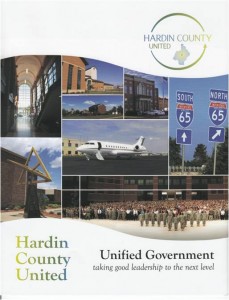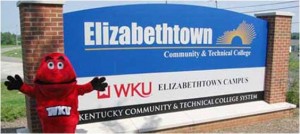Introduction
Hardin County, KY is one of the largest counties in the Commonwealth of Kentucky, with a population of nearly 110,000 people, and is the principal county in the Elizabethtown – Fort Knox Metropolitan Statistical Area. Hardin County is the home of Fort Knox, one of the country’s largest Army posts. The community has a thriving economy with nearly 75 manufacturing companies which employ thousands of workers.
 In 2010, Hardin County Government, while preparing for massive growth brought about by base realignment (commonly referred to as BRAC) at Fort Knox, elected to conduct a community visioning process. The Hardin County Visioning Project, sponsored by county government in partnership with the Lincoln Trail Area Development District and the United States Department of Defense Office of Economic Adjustment, included a strategic assessment of the community, an analysis of benchmark communities, an extensive survey of over 100 community leaders and resulted in the development of 24 strategic goals for the community to consider implementing over the next 15 years.
In 2010, Hardin County Government, while preparing for massive growth brought about by base realignment (commonly referred to as BRAC) at Fort Knox, elected to conduct a community visioning process. The Hardin County Visioning Project, sponsored by county government in partnership with the Lincoln Trail Area Development District and the United States Department of Defense Office of Economic Adjustment, included a strategic assessment of the community, an analysis of benchmark communities, an extensive survey of over 100 community leaders and resulted in the development of 24 strategic goals for the community to consider implementing over the next 15 years.
The overarching theme from the visioning process was one of unification, along with the elimination of duplicative services where they exist.
Hardin County United (HCU), created to develop implementation strategies for many of the goals, elected to pursue the issue of unified government and retained L.B. Schmidt & Associates, LLC to conduct detailed research on the issue of unified government.
Project Scope
Luke Schmidt worked closely with the chairperson of the HCU Governance Subcommittee, which oversaw the project. As the project moved forward, the following milestones were achieved:
 Conducted detailed analysis of the existing government structure in Hardin County (included county government and six incorporated cities)
Conducted detailed analysis of the existing government structure in Hardin County (included county government and six incorporated cities)- Interviewed panels of impacted groups (e.g., law enforcement, fire protection, state elected officials, federal elected officials, Fort Knox, etc.)
- Conducted site visits to communities which have previously unified their local governments (included Athens – Clarke County, GA; Augusta – Richmond County, GA; Columbus – Muscogee County, GA)
- Facilitated presentation to HCU Governance Subcommittee by the last mayor of the City of Lexington (KY) and the first elected mayor of the Lexington – Fayette County Urban County Government
- Facilitated presentation to HCU Governance Subcommittee by the last mayor of the City of Louisville (KY) and the first elected mayor of the Louisville – Jefferson County Metropolitan Government (Louisville Metro)
- Researched the three existing Kentucky statutes which allow cities and counties to merge
Project Findings
In the end, a 200+ page report was presented to the HCU Governance Subcommittee. The research illustrated a significant amount of duplication of government services among the existing Hardin County jurisdictions (94 units of government which govern a community of 110,000 people). The report indicated that communities that have unified generally are able to provide government services more efficiently, are able to hold down the rising cost of providing government services and have a more unified approach to economic development which assists in creating new jobs.
 In particular, the report indicated that the following benefits would accrue to Hardin County if it were to unify all of its existing jurisdictions:
In particular, the report indicated that the following benefits would accrue to Hardin County if it were to unify all of its existing jurisdictions:
- Attain a new level of clout as Kentucky’s third largest community
- Speak with one voice and more efficiently target grants and appropriations in Frankfort and Washington, D.C.
- Streamline government
- Achieve economies of scale within local government
Path Forward
The HCU Governance Subcommittee and Steering Committee both agreed to move the issue forward in the community, by recommending that the community’s jurisdictions unify under the Unified Government statute. The process started by significantly ramping up the HCU web site to include lots of information for the community’s citizens on unified government.
HCU also produced a collateral piece on the issue which was used as a leave-behind. HCU’s Governance Subcommittee chairperson and Luke Schmidt gave 24 presentations in the community on the report, its findings and the potential benefits of unified government. One issue which quickly developed concerned what would happen if one jurisdiction’s voters, when voting on a plan of unified government were to vote no on the issue, while the other jurisdictions’ voters all voted yes. HCU agreed that the current statute was vague and pledged to clarify the issue.
 Luke Schmidt worked with members of Hardin County’s delegation to the Kentucky General Assembly, along with representatives from the Kentucky League of Cities and introduced House Bill 190 (which eventually became House Bill 189). House Bill 189 strengthened the existing statute and gave added protections to voters in the various jurisdictions which might consider a plan of unified government. As HB 189 moved through the legislative process it never received a single negative vote either at the committee or floor level in both the Kentucky State House of Representatives and the Kentucky State Senate. HB 189 was signed into law by Governor Steve Beshear.
Luke Schmidt worked with members of Hardin County’s delegation to the Kentucky General Assembly, along with representatives from the Kentucky League of Cities and introduced House Bill 190 (which eventually became House Bill 189). House Bill 189 strengthened the existing statute and gave added protections to voters in the various jurisdictions which might consider a plan of unified government. As HB 189 moved through the legislative process it never received a single negative vote either at the committee or floor level in both the Kentucky State House of Representatives and the Kentucky State Senate. HB 189 was signed into law by Governor Steve Beshear.
The next step was to work to pass an ordinance in each jurisdiction which would create a Unification Review Commission. The Commission, as outlined by Kentucky law, would create an actual plan of unified government which would ultimately be presented to the voters in each participating jurisdiction for review and approval. Only the Commission can legally create such a plan and only the voters can approve it. While there was significant interest in moving towards the Commission, the environment was not yet right to pass the ordinances. Unifying local governments is a lengthy process which often results in negative votes/actions before ultimate, final success. HCU is now evaluating its next step with regard to moving the issue forward.
###


















